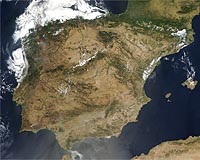| . |  |
. |
Alexandria, Egypt (AFP) July 28, 2009 Water ministers from Nile Basin countries on Tuesday delayed signing a water-sharing pact already rejected by Egypt and Sudan, who oppose any reduction in their traditional quotas. Ministers from nine Nile Basin countries and Eritrea, which had observer status at the four-day meeting held in the Egyptian Mediterranean city of Alexandria, put off finalising the treaty for six months. "Six months was allocated to solve the problem," Ethiopian Minister of Water Resources Asfaw Dingamo told reporters at the end of the meeting. "Before that our technical advisers will sit down and come up with a technical agreement to be signed," he said. Other Nile Basin countries, some of which suffer periodic droughts, drafted the Cooperative Framework Agreement (CFA) in June at a Democratic Republic of Congo summit that omitted mention of Egypt and Sudan's historic claims. "It is a big victory," a Sudanese official, who requested anonymity because he was not authorised to speak to the media, said. "They were going to sign the agreement beginning August 1 regardless of Egypt and Sudan." At the heart of the dispute is a 1929 agreement between Egypt and Great Britain, acting on behalf of its African colonies along the 5,584 kilometre (3,470 mile) river, which gave Egypt veto power over upstream projects. An between Egypt and Sudan in 1959 allowed Egypt 55.5 billion cubic metres of water each year -- 87 percent of the Nile's flow -- and Sudan 18.5 billion cubic metres. Some of the Nile Basin countries, which include Ethiopia, Tanzania, Uganda, Kenya and the DRC, say past treaties are unfair and they want an equitable water-sharing agreement that would allow for more irrigation and power projects. Egypt, a mostly arid country that relies on the Nile for the majority of its water, argues that up-stream countries could make better use of rainfall and have other sources of water. With almost 80 million people, Egypt's water demands are projected to exceed its supply by 2017, according to a government reported published earlier this month. There is "no way" Egypt would allow a reduction of its quota, Mona Omar, Egyptian deputy foreign minister for African affairs, told reporters. Egypt sought to downplay the differences after the summit, and said it is proposing economic incentives to the countries. "It's normal that there are disagreements," cabinet spokesman Magdi Riyad said at a press conference. "(But) there was a unanimous agreement that the resources of the Nile Basin were more than enough if managed properly." He said Egypt proposes widening the scope of the Nile Basin Initiative, the World Bank funded umbrella group of Nile Basin countries, to include other natural resources. Share This Article With Planet Earth
Related Links Water News - Science, Technology and Politics
 Rainfall To Decrease Over Iberian Peninsula
Rainfall To Decrease Over Iberian PeninsulaMadrid, Spain (SPX) Jul 24, 2009 Scientists have recorded a decline in winter precipitation over the past 60 years in Spain, and they now forecast that precipitation will also decrease in spring and summer. A team from the Pyrenean Institute of Ecology (CSIC) has studied rainfall data from 1950 to 2006 and the climate projections for coming decades, showing that less rain will fall in future over the Iberian Peninsula. ... read more |
|
| The content herein, unless otherwise known to be public domain, are Copyright 1995-2009 - SpaceDaily. AFP and UPI Wire Stories are copyright Agence France-Presse and United Press International. ESA Portal Reports are copyright European Space Agency. All NASA sourced material is public domain. Additional copyrights may apply in whole or part to other bona fide parties. Advertising does not imply endorsement,agreement or approval of any opinions, statements or information provided by SpaceDaily on any Web page published or hosted by SpaceDaily. Privacy Statement |